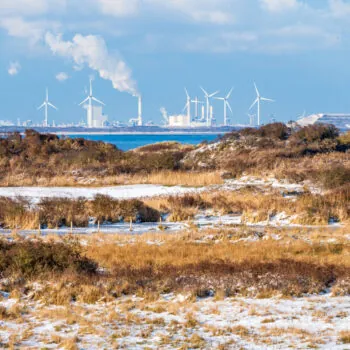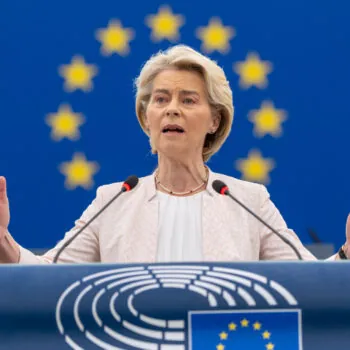On one level, any discussion of the future of climate diplomacy cannot help but be overshadowed by a history of failure. From the beginning of the story of the international community’s response to the greenhouse effect, to its current chapter, the number of parts per million (ppm) of carbon dioxide in the atmosphere has risen, relentlessly.
At the first gathering of the United Nations Framework Convention on Climate Change (UNFCCC) in 1992, when nations committed to stabilising greenhouse gas concentrations, the number sat at 355ppm. This year, after 24 Conferences of the Parties (COPs), it hit 415ppm, the highest level in 14 million years. Years of climate diplomacy within the UNFCCC process delivered the Paris Agreement in 2015, which is the only global agreement and best hope we’ve got to collectively reduce those concentrations.

And yet emissions still keep rising. As E3G’s Claire Healy said at the beginning of our Chatham House event during the first-ever London Climate Action Week, “these are the facts, so evidently we need to come up with new models of climate diplomacy that incorporate all actors from across the economy to strengthen and support implementation of the Paris Agreement and rapidly decarbonize our economies.” In essence, this is the leitmotif of London Climate Action Week.
Encouragingly, there are other facts. The UK’s Special Representative for Climate Change at the Foreign and Commonwealth Office (FCO), Nick Bridge, outlined a few. Starting at home, the UK government has committed to “net-zero” emissions by 2050, the most ambitious legislation of any major economy. It has now effectively secured its bid to host COP26 in partnership with Italy, where the 197 UNFCCC member states who have signed or acceded to the Paris Agreement will submit their next round of pledges to 2030 and longer term decarbonisation strategies. The economics of the climate transition are in a fundamentally different place, with a revolution in technology and the unit-cost of energy driving ambition in places and at speeds never seen before. Developing giants, such as India, have made bold commitments in key areas like solar, wind and combustion engines, as the double- and triple-dividend potential of emissions mitigation sinks in.
Progress on the climate security and resilience agendas seems to have followed a similar path. At an event hosted by the Dutch Ambassador, run by E3G in partnership with the Dutch Embassy, the Clingendael Institute and the Planetary Security Initiative, E3G CEO Nick Mabey recalled writing the first paper on climate change for the UK Ministry of Defence, and a two-page briefing for the FCO’s mission to the first UN Security Council debate on the topic, both in 2007. That same year the European Council called on High Representative Javier Solana to consider the issue, and his report concluded that climate change should be seen as “a threat multiplier which exacerbates existing trends, tensions and instability.”
The decade following, however, saw climate security simmer at the academic fringes of the defence, development and diplomacy communities, with little tangible action from international institutions. But in the last 18 months the UN Security Council’s consideration of the issue has increased in breadth and depth. Successive Planetary Security Conferences have turned a committed community of practice into a launch pad for concrete action – at the policy level and on the ground. The urgency of street protests has created even greater space for the climate crisis to be discussed in terms of the fundamental material threat it presents to livelihoods, while the public order threat presented by air pollution in China and Extinction Rebellion in London have jolted both governments into action. And as argued by General Tom Middendorp (Ret.), Chair of the new International Military Council on Climate and Security, and Dr Amiera Sawas of ActionAid, defence and development actors are progressively more inclined to look towards the root causes of conflict and strife, instead of surface-level (and often, in resource terms, detrimental) interventions.
This emerging tendency, to look past traditional targets and associated obstacles and across all government departments and economic sectors, carries promise for the future of climate diplomacy. The US decision to pull out of the Paris Agreement, as the country’s former Special Envoy on Climate Change Todd Stern noted, has not deterred states and cities as well as non-state actors including businesses and banks, from forging their own paths on climate action. In fact, it may even have helped push climate change and the environment, almost 50 years on from the first, zeitgeist-defining Earth Day of 1970, back on to the very top of Democrat and young Republican political agendas. Meanwhile the stark appeal of Greta Thunberg and school strikers has penetrated high-level national discourses and ignited youth and social movements in countries across the world.
Such power vested in ‘diplomacy from below’ might not always be so productive, however, and throughout London Climate Action Week the spectre of a popular ‘climate resistance’ loomed. Perhaps with this in mind, Chatham House attendees were divided on whether Thunberg and her ilk should really be dubbed “the new climate diplomats”. Additionally the intense scrutiny this advocacy will bring to negotiations makes expectation management and success stories, key to defining Paris, significantly more difficult.
Old challenges of laggards and rogues also reared their heads. On Russia and Brazil, Rear Admiral Neil Morisetti (Ret.) and Dr Louise van Schaik of the Clingendael Institute both argued that trade sanctions remain an important tool in the arsenal of EU climate diplomacy. Pete Betts, former Director of International Climate and Energy for the UK government, drew attention to the sheer scale of China’s growing emissions, and argued that leadership from the UK and Europe is only as powerful as its ability to leverage change here, in India and elsewhere.

Audience opinion, polled at the inaugural London Climate Frontiers Forum on Friday 5 July.
This kind of self-reflection on the entanglement of ‘leaders’ with ‘laggards’ was a recurring theme. When asked about the most important venues for climate diplomacy in 2020, the audience at the London Climate Frontiers Forum voted the statement “Diplomacy begins at home” second only to COP26. Militaries’ own emissions and resilient defence and development infrastructure are slowly making their way onto the list of departmental priorities in these fields. Changing financial systems, centred in cities like London, will be central to reifying the real economy opportunities available to developing countries.
And in all of this, the lessons and successes of torch bearers, particularly those facing the greatest challenges and the most vulnerability in the global south, will be crucial to holding moral clout in showing what can be done, and why it is necessary.
As the FCO’s Nick Bridge argued, “In my work, the most powerful lever is always ‘What are you doing yourself? And can you walk the talk?’”


